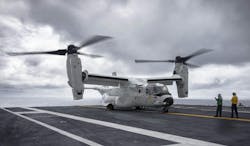Navy orders five more CMV-22B tiltrotor aircraft and avionics with radar for carrier-on-board-delivery
PATUXENT RIVER NAS, Md. – U.S. military aviation officials are ordering five CMV-22B tiltrotor aircraft and avionics from the Bell-Boeing Joint Project Office (JPO) in Amarillo, Texas, under terms of a $590 million order announced in March.
Officials of the U.S. Naval Air Systems Command at Patuxent River Naval Air Station, Md., are asking the Bell-Boeing JPO to build five CMV-22B aircraft for the Navy. The Bell-Boeing JPO is a joint venture of Bell Helicopter in Fort Worth, Texas, and the Boeing Co. Defense, Space & Security segment in St. Louis.
Speed and range
The V-22 Osprey uses tiltrotor technology to combine the vertical performance of a helicopter with the speed and range of a fixed-wing aircraft. It features vertical take-off and landing (VTOL) and short take-off and landing (STOL) capabilities, and is designed long-range high-speed missions.
The Navy CMV-22B will serve as the future carrier onboard delivery (COD) aircraft. The COD mission, now handled by the Northrop Grumman C-2A Greyhound turboprop fixed-wing aircraft, carriers people, mail, supplies, medical patients, and equipment to aircraft carriers at sea from shore facilities.
The aircraft has a weather radar, a forward firing ALE-47 airborne countermeasures dispenser system, improved hover coupled features, and an improved environmental conditioning system, compared to earlier versions of the tiltrotor aircraft.
The V-22 Osprey is a joint service, multirole combat aircraft that uses tiltrotor technology to combine the speed and range of a fixed-wing airplane with the vertical performance of a helicopter.
Helicopters and airplanes
With its nacelles and rotors in vertical position, it can take off, land, and hover like a helicopter. Once airborne, its nacelles rotate forward to transform the aircraft into a turboprop airplane capable of high-speed and high-altitude flight.
On this order Bell-Boeing will do the work in Fort Worth, Red Oak, McKinney, and Amarillo, Texas; Ridley Park, Pa.; East Aurora and Endicott, N.Y.; and Park City, Utah, and should be finished by January 2028.
For more information contact the Bell-Boeing JPO online at https://www.bellflight.com/products/bell-boeing-v-22, or Naval Air Systems Command at https://www.navair.navy.mil.
About the Author
John Keller
Editor-in-Chief
John Keller is the Editor-in-Chief, Military & Aerospace Electronics Magazine--provides extensive coverage and analysis of enabling electronics and optoelectronic technologies in military, space and commercial aviation applications. John has been a member of the Military & Aerospace Electronics staff since 1989 and chief editor since 1995.
